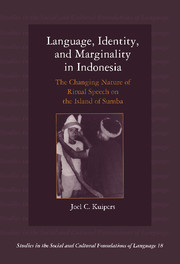 Language, Identity, and Marginality in Indonesia
Language, Identity, and Marginality in Indonesia Book contents
- Frontmatter
- Contents
- List of plates
- List of figures and tables
- Preface
- Acknowledgements
- Notes on orthography
- 1 Introduction
- 2 Place, identity, and the shifting forms of cultivated speech: a geography of marginality
- 3 Towering in rage and cowering in fear: emotion, self, and verbal expression in Sumba
- 4 Changing forms of political expression: the role of ideologies of audience completeness
- 5 Ideologies of personal naming and language shift
- 6 From miracles to classrooms: changing forms of erasure in the learning of ritual speech
- 7 Conclusions
- Notes
- Appendix
- References
- Index
- STUDIES IN THE SOCIAL AND CULTURAL FOUNDATIONS OF LANGUAGE
5 - Ideologies of personal naming and language shift
Published online by Cambridge University Press: 05 July 2011
- Frontmatter
- Contents
- List of plates
- List of figures and tables
- Preface
- Acknowledgements
- Notes on orthography
- 1 Introduction
- 2 Place, identity, and the shifting forms of cultivated speech: a geography of marginality
- 3 Towering in rage and cowering in fear: emotion, self, and verbal expression in Sumba
- 4 Changing forms of political expression: the role of ideologies of audience completeness
- 5 Ideologies of personal naming and language shift
- 6 From miracles to classrooms: changing forms of erasure in the learning of ritual speech
- 7 Conclusions
- Notes
- Appendix
- References
- Index
- STUDIES IN THE SOCIAL AND CULTURAL FOUNDATIONS OF LANGUAGE
Summary
Samuel Roos, Sumba's first Dutch administrator in the nineteenth century, was struck by the fact that even friendly Sumbanese would not directly tell him their names. “If you ask a Sumbanese his name, he laughs and gives no answer. If others are present, then he says, ‘ask him,’ and points to that person.” (Roos 1872: 70). Even though the names are not secret, and they are proud to have their names mentioned by others, it is somewhat awkward for a Sumbanese to tell you his or her name. Roos, as a European outsider, assumed that the function of names was to refer to particular individuals. The names for him were primarily a linguistic tool for individuating particular persons. Sumbanese – particularly the high-status ones with whom he describes his early encounters – assumed that the role of a name is a more social one, in which names are actually in the custody of others, who use them for address and classification.
The problem Roos encountered is not unique to Sumba. Proper names pose special problems for studies of language change in general: should they be considered a narrowly personal, linguistic possession or a more broadly social and collective phenomenon? What is the relation, if any, between name changes and linguistic marginalization? In some cases of language shift, personal names seem to answer to a different call, as it were, from the rest of the language. They do not necessarily change in the same way, or at the same rate, as other features of language.
- Type
- Chapter
- Information
- Language, Identity, and Marginality in IndonesiaThe Changing Nature of Ritual Speech on the Island of Sumba, pp. 95 - 124Publisher: Cambridge University PressPrint publication year: 1998
